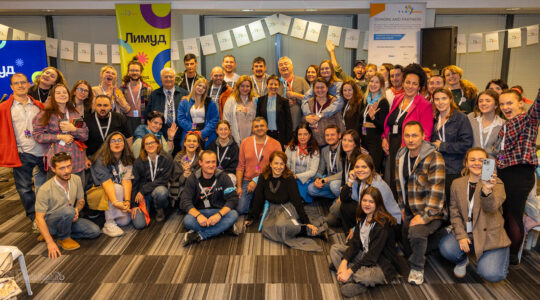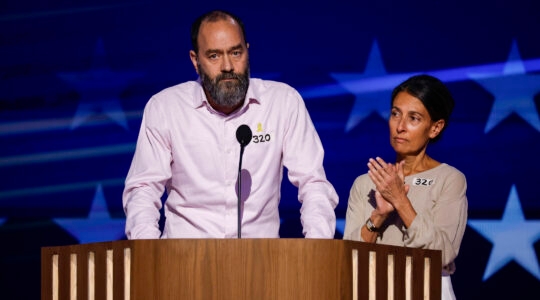WASHINGTON (JTA) — President Barack Obama and Prime Minister Benjamin Netanyahu may not have bridged their differences on how to deal with Iran, but each managed to give the other a measure of reassurance.
In his speech to the American Israel Public Affairs Committee, Obama held his ground, declining to articulate new American red lines on the Iranian nuclear issue and strongly advising against “loose talk of war.” Yet he earned the praise of the prime minister and the pro-Israel lobby with his acknowledgement that Israel needs to be able to defend itself, and his vow that America has Israel’s back.
While Obama stressed diplomacy as a continued option in public and private comments, Netanyahu indicated in the two leaders’ private meeting that he believes sanctions have been exhausted. Yet even if the prime minister does not share the president’s patience, he also told Obama that there is not yet any Israeli decision to attack Iran, according to Israeli press reports.
“We do believe that there is still a window that allows for a diplomatic resolution to this issue, but ultimately the Iranians’ regime has to make a decision to move in that direction, a decision that they have not made thus far,” Obama said in an Oval Office photo-op Monday morning ahead of the leaders’ two-hour meeting, which was followed by what aides described as an “expansive” lunch.
He added, looking at Netanyahu, “I know that both the prime minister and I prefer to resolve this diplomatically. We understand the costs of any military action.”
Netanyahu did not acknowledge the president’s plea for diplomacy to play itself out, instead emphasizing Israel’s sovereign right to act — and noting that Obama had made the same point in his speech the day before to AIPAC’s annual policy forum.
“I think that above and beyond that there are two principles, longstanding principles of American policy that you reiterated yesterday in your speech — that Israel must have the ability always to defend itself by itself against any threat; and that when it comes to Israel’s security, Israel has the right, the sovereign right to make its own decisions,” Netanyahu said.
“I believe that’s why you appreciate, Mr. President, that Israel must reserve the right to defend itself. And after all, that’s the very purpose of the Jewish state — to restore to the Jewish people control over our destiny,” he continued. “And that’s why my supreme responsibility as prime minister of Israel is to ensure that Israel remains the master of its fate.”
That acknowledgement — that Israel has the right to strike in its own perceived self-defense — was the element that AIPAC’s leaders were seeking, and Obama earned the most extended standing ovation of the day when he told the conference: “Israel must always have the ability to defend itself, by itself, against any threat.”
Another crowd pleaser was the president’s pledge that “the United States will always have Israel’s back when it comes to Israel’s security.”
How to deal with Iran dominated much of the meeting between the leaders. As if to underscore Netanyahu’s message of his determination to confront the Iranian regime, his gift to Obama was a copy of the Megillah, the tale of the Persian Jews’ bloody triumph over Haman.
An Israeli source said the meeting underscored agreement between the Netanyahu and Obama governments in four areas: a determination to prevent an Iranian nuclear weapon; that all options are on the table; that containment is not an option; that Israel is a sovereign state that has a right to defend itself by itself.
In his own address to the conference on Monday morning — delivered as Obama and Netanyahu were meeting — Howard Kohr, AIPAC’s executive director, made it clear that the fourth message was the one AIPAC had been seeking.
“This is the context in which Israel must decide her course of action,” he said. “If she can put her fate in the hands of anyone — even her closest ally, America — or if she must conduct a strike to postpone Iran from acquiring a nuclear bomb. Israel was created to ensure that the Jewish people would never have to put their fate in the hands of others.”
Kohr also pushed back strongly against those who say that Obama has not done enough to confront Iran.
“President Obama and his administration are to be commended,” he said. “They have — more than any other administration, more than any other country — brought unprecedented pressure to bear on Tehran through the use of biting economic sanctions. They have built a broad coalition to isolate the Iranian regime and they have brought the necessary military assets to the gulf and to Iran’s neighbors in order to signal that America has the power to act.”
Kohr echoed Democrats in their pleas not to make Iran policy a partisan issue. Republican salvos against Obama have frustrated his supporters, who say that the criticisms fail to take into account the strides he has made in isolating Iran.
While campaigning in Georgia on Sunday, GOP presidential hopeful Mitt Romney said that Obama had “failed to communicate that military options are on the table.”
The president and administration officials have repeatedly stressed that all options are on the table, even as they call for giving sanctions time to work. In his Sunday speech to AIPAC, Obama said that there is “too much loose talk of war,” arguing that “now is not the time for bluster.”
JTA has documented Jewish history in real-time for over a century. Keep our journalism strong by joining us in supporting independent, award-winning reporting.





